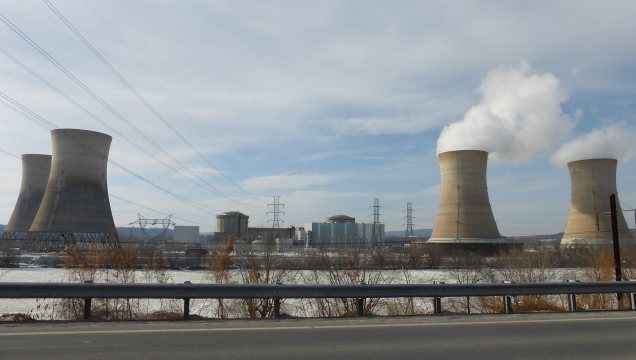
Nuclear power industry feeling the renewables pinch | Image: Z22, CC BY-SA 3.0, Link
The future of Three Mile Island Nuclear Generating Station (TMI) is in doubt after again failing to get a guernsey in an important electricity auction.
Last week, Exelon Corporation announced TMI did not clear in the latest PJM capacity auction, placing it at risk of early retirement. TMI did not clear in the past three PJM base residual auctions.
PJM Interconnection controls power in parts of 13 US states and the recent auction would have guaranteed the sale of TMI’s electricity in 2020 and 2021.
According to LancasterOnline, electricity generated by natural gas and subsidised wind and solar power sources are increasingly eating the nuclear power industry’s lunch. The TMI plant has lost USD $300 million over the last eight years
TMI’s Unit 1 reactor (TMI-1) started commercial operations on September 2, 1974 and is licensed to operate until April 19, 2034. However, it has been reported that without the support of subsidies or a price on carbon, the challenging environment could see it shuttered in two years.
Three Mile Island Nuclear Accident
Three Mile Island Nuclear Generating Station was the site of the most serious accident in U.S. commercial nuclear power plant operating history.
The Three Mile Island Unit 2 (TMI-2) reactor partially melted down on March 28, 1979, just over a year after it commenced commercial operations – and has been closed ever since. Prior to the accident that would seal its fate, the reactor had shut down twelve times due to issues with feedwater.
The Other Nuclear Power Threat
While safety may have improved in U.S. nuclear power plant operation as a result of the TMI event, another serious risk has been growing.
Princeton University and Union of Concerned Scientist (UCS) researchers say U.S. nuclear regulators have greatly underestimated the potential for a nuclear power related disaster through the occurrence of a catastrophic nuclear-waste fire at any one of dozens of reactor sites across the country.
Such an incident could result in millions of residents in surrounding communities having to relocate for years.
UCS has previously stated widespread adoption of solar power and other renewables is a crucial step to forestalling the worst effects of climate change, cutting electricity bills for consumers and building a more resilient grid.
Nuclear power is falling out of favour in some countries, triggered in part by 2011’s Fukushima Daiichi nuclear disaster. Last week we reported Swiss voters had endorsed a government plan that will see a major boost to renewables and nuclear power phased out in the country.

 RSS - Posts
RSS - Posts



Speak Your Mind